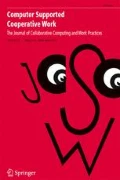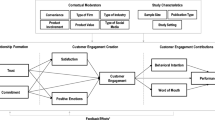Abstract
Online communities depend on the persistent contributions of heterogeneous users with diverse motivations and ways of participating. As these online communities exist over time, it is possible that users change the way in which they contribute to the site. Through interviews with 31 long-term members of a user-generated content community who have decreased their participation on the site, we examined the meaning that these users gave to their contribution and how their new participation patterns related to their initial motivations. We complement the reader-to-leader framework (Preece and Shneiderman: AIS Transactions on Human-Computer Interaction, vol. 1, no. 1, pp. 13–32, 2009) by propounding the concept of latent user to understand decreasing content contribution and user life-cycles in online communities. We showed that even though latent users decrease their content contribution, their participation becomes more selective and remained consistent with initial motivations to participate.


Similar content being viewed by others
References
Antin, J. (2011): My Kind of People?: Perceptions About Wikipedia Contributors and their Motivations. In CHI’ 11. Proceedings of the Conference on Human factors in Computing System, Vancouver, Canada, May 7–12, 2011. New York, N.Y.: ACM Press, pp. 3411–3420.
Baumer, E.P.S., M. Sueyoshi, and B. Tomlinson (2011): Bloggers and readers blogging together: Collaborative co-creation of political blogs Computer Supported Cooperative Work (CSCW): An International Journal, vol. 20, nos. 1–2, April 2011, pp. 1–36.
Bryant, S.L., A. Forte, and A. Bruckman (2005): Becoming Wikipedian: Transformation of Participation in a Collaborative Online Encyclopedia. In GROUP’05. Proceedings of the International ACM SIGGROUP Conference on Supporting Group Work, Sanibel Island, FL. USA, October 6–9, 2005. New York: ACM Press, pp. 1–10.
Burke, M., C. Marlow, and T. Lento (2009): Feed me: Motivating Newcomer Contribution in Social Network Sites. In CHI’09. Proceedings of the International Conference on Human factors in Computing Systems, Boston, MA., USA, April 4–9, 2009. New York, NY: ACM Press, pp. 945–954.
Cheshire, C. and J. Antin (2008): The social psychological effects of feedback on the production of internet information pools. Journal of Computer-Mediated Communication, vol. 13, no. 3, pp. 705–727.
Dholakia, U.M., R.P. Bagozzi, and L.K. Pearo (2004): A social influence model of consumer participation in network- and small-group-based virtual communities. International Journal of Research in Marketing, vol. 21, no. 3, pp. 241–263.
Heckathorn, D.D. (1997): Respondent-driven sampling: A new approach to the study of hidden populations. Social Problems, vol. 44, no. 2, pp. 174–199.
Joinson, A.N. (2008): Looking at, Looking up or Keeping up with People?: Motives and Use of Facebook. In CHI’08. Proceedings of the International Conference on Human Factors in Computing Systems, Florence, Italy, April 5–10, 2008. New York, N.Y.: ACM Press, pp. 1027–1036.
King, Nigel and Christine Horrocks. (2010): Interviews in Qualitative Research. Los Angeles, C.A.: Sage.
Kollock, P. (1999): The economies of online cooperation. In M.A. Smith and P. Kollock (eds): Communities in cyberspace. New York, N.Y: Routledge, pp. 220–239.
Kuzel, A.J. (1999): Sampling in qualitative inquiry. In B.F. Crabtree and W.L. Miller (eds): Doing qualitative research. Thousand Oaks, CA.: SAGE, pp. 33–46.
Lakhani, K.R. and R.G. Wolf (2005): Why hackers do what they do: Understanding motivation and effort in free/open source software projects. In J. Feller, B. Fitzgerald, S. Hissam and K.R. Lakhani (eds): Perspectives on free and open source software. Cambridge, MA.: MIT Press, pp. 3–22.
Lampe, C., N. Ellison, and C. Steinfield (2006): A Face(book) in the Crowd: Social Searching vs. Social Browsing. In CSCW’06. Proceedings of the Conference on Computer Supported Cooperative Work, Banff, Alberta, Canada, November 4–8, 2006. New York, NY: ACM Press, pp. 167–170.
Lampe, C. and E. Johnston (2005): Follow the (Slash) Dot: Effects of Feedback on New Members in an Online Community. In GROUP’05. Proceedings of the International ACM SIGGROUP Conference on Supporting Group Work, Sanibel Island, FL., USA, November 6–9, 2005. New York, N.Y.: ACM Press, pp. 11–20.
Lampe, C., R. Wash, A. Velasquez, and E. Ozkaya (2010): Motivations to Contribute to Online Communities. In CHI’10. Proceedings of the International Conference on Human Factors in Computing Systems, Atlanta, GA. USA, April 10–15, 2010. New York, N.Y.: ACM Press, pp. 1927–1936.
LaRose, R. (2010): The problem of media habits. Communication Theory, vol. 20, no. 2, pp. 194–222.
McCully, W., C. Lampe, C. Sarkar, A. Velasquez, and A. Sreenivasan (2011): Online and Offline Interactions in Online Communities. In WikiSym’11. Proceedings of the International Symposium on Wikis and Open Collaboration, Mountain View, CA, October 3–6, 2011. New York, N.Y.: ACM Press, pp. 39–48.
Miles, M.B. and M.A. Huberman (1994): Qualitative data analysis: An expanded sourcebook. Beverly Hills, C.A.: Sage Publications.
Nonnecke, B. and J. Preece (2000): Lurker Demographics: Counting the Silent. In CHI’00. Proceedings of the SIGCHI Conference on Human Factors in Computing Systems, The Hague, Amsterdam. Netherlands, April 1–6, 2000. New York, N.Y.: ACM Press pp. 73–80.
Nov, Oded (2007).: What motivates wikipedians? Communications of the ACM, vol. 50, no. 11, November 2007, pp. 60–64.
Onwuegbuzie, A.J. and N.L. Leech (2007): Validity and qualitative research: An oxymoron? Quality and quantity, vol. 41, no. 2, pp. 13–32.
Panciera, K. (2011): User Lifecycles in Cyclopath: A Survey of Users. In iConference’11. Proceedings of the ACM iConference, Seattle, Washington, February 8–11, 2011. New York, N.Y.: ACM Press, pp. 741–742.
Panciera, K., R. Priedhorsky, T. Erickson, and L. Terveen (2010): Lurking? Cyclopaths?: A Quantitative Lifecycle Analysis of User Behavior in a Geowiki. In CHI’ 10. Proceedings of the International Conference on Human Factors in Computing Systems, Atlanta, Georgia, USA, April 10–15, 2010. New York, N.Y.: ACM Press, pp. 1917–1926.
Preece, J. and D. Maloney-Krichmar (2005): Online Communities: Design, Theory and Practice. Journal of Computer-Mediated Communication, vol. 10, no. 1.
Preece, J. and B. Shneiderman (2009): The reader-to-leader framework: motivating technology-mediated social participation. AIS Transactions on Human-Computer Interaction, vol. 1, no. 1, pp. 13–32.
Singh, V. (2012): Newcomer Integration and Learning in Technical Support Communities for Open Source Software. In GROUP’ 12. Proceedings of the ACM International Conference on Supporting Group Work, Sanibel Island, FL. October 27–31, 2012. New York, N.Y.: ACM Press, pp. 65–74.
Yang, H.-L. and C.-Y. Lai (2010): Motivations of Wikipedia content contributors. Computers in Human Behavior, vol. 26, no. 6, pp. 1377–1383.
Welser, H. T., D. Cosley, G. Kossinets, A. Lin, F. Dokshin, G. Gay, and M. Smith (2011): Finding Social Roles in Wikipedia. In iConference’11. Proceedings of the 2011 iConference, Seattle, Washington, February 8–11, 2011. New York, N.Y.: ACM Press, pp. 122–129.
Wilkinson, D.M. (2008): Strong Regularities in Online Peer Production. In EC’ 08. Proceedings of the ACM conference on Electronic Commerce, Chicago, Illinois, USA, July 8–12, 2008. New York, NY: ACM Press Chicago, Il, USA, pp. 302–309.
Wohn, D.Y., A.V. Tor Bjornrud, and C. Lampe (2012): Habit as an Explanation of Participation in an Online Peer-Production Community. In CHI’12. Proceedings of the International Conference on Human Factors in Computing Systems, Austin TX. USA, May 5–10, 2012. New York, N.Y.: ACM Press, pp. 2905–2914.
Acknowledgments
We would like to thank members of the BIT Lab at Michigan State University for their feedback on this manuscript. We would also like to thank the members of Everything2 for supporting research in online community participation. This work was supported by NSF grant IIS-HCC-0812429. We would also like to thank Chandan Sarkar and Chris Hamrick for their help and feedback.
Notes
- 1
- 2
-
3
All names are pseudonyms assigned to our respondents to protect their privacy
Author information
Authors and Affiliations
Corresponding author
Rights and permissions
About this article
Cite this article
Velasquez, A., Wash, R., Lampe, C. et al. Latent Users in an Online User-Generated Content Community. Comput Supported Coop Work 23, 21–50 (2014). https://doi.org/10.1007/s10606-013-9188-4
Published:
Issue Date:
DOI: https://doi.org/10.1007/s10606-013-9188-4




